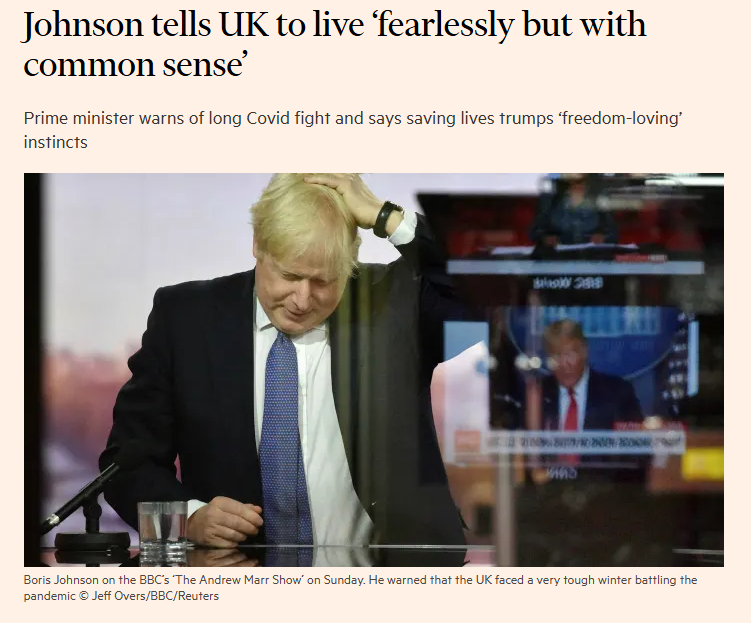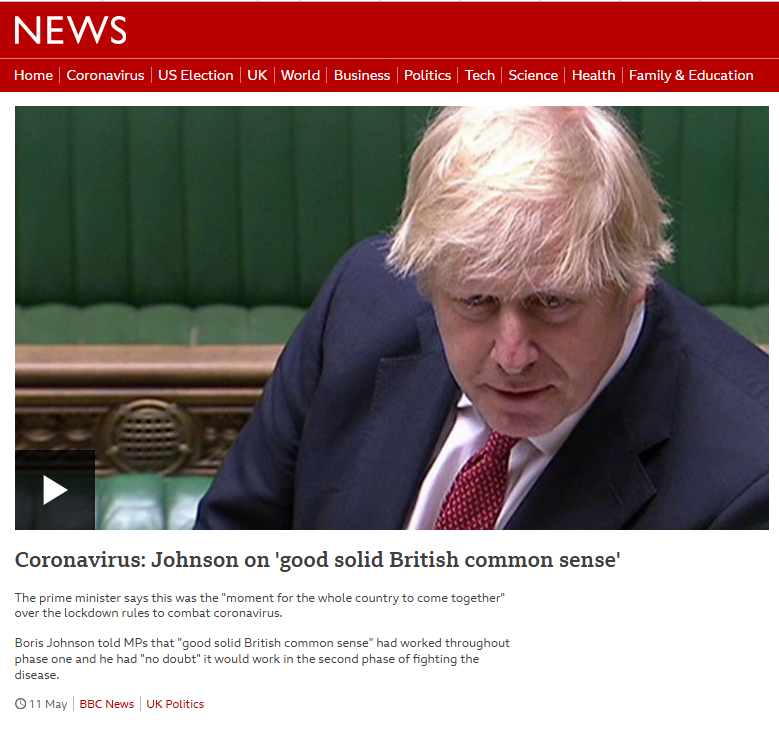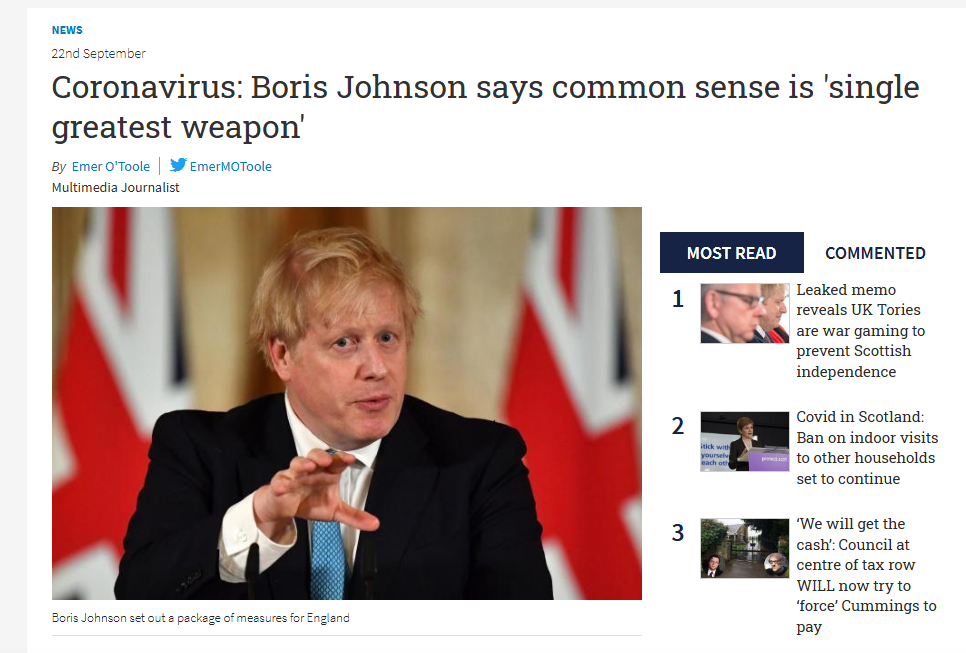
There is an idea that you can’t do in the UK what, for example, the Chinese government has done, in strictly enforcing Coronavirus measures.
Mr Johnson would have us believe the problem is we are “freedom-loving”. We are not the sort to be coerced. You don’t force people like the Brits to comply, and if you tried, it wouldn’t work. Instead, his government frequently speaks of, and to, our “good, solid common sense”, suggesting that as individuals – inherently decent, inherently sensible, and fiercely independent – we will just “do the right thing”.
“It makes tackling the virus trickier than in other countries,” seems to be the thought, “but, in the end, Brits know best.”

There’s a little truth in this. But much harm.
Of course we need individuals to take responsibility. We can’t police everyone. We really aren’t China. And of course we need individuals to believe in the rules by which we hope they might abide. We need what they call “buy-in”.
But for buy-in to work, several other elements are required:
– Information. People need to understand what it is that, collectively, we are up against. There are now no daily briefings. If you want detail on the daily stats, you have to go hunting for them on the internet.
– Clear rules. A product of the piecemeal, targeted approach, and changing conditions, is an almost total loss of clarity. Even the prime minister doesn’t know what rules he is imposing – as evidenced by a recent embarrassing interview – and the rest of us are implored to enter our postcodes, somewhere on the internet, to find out. You want rules? You have to go hunting for them on the internet.
– Fair rules. Targeted rules still have to select large areas. The only way to avoid that is Test Trace and Isolate, which we do not have because, bluntly, the government tried to get the private sector to deliver it. That failure is of epic proportions, but not for this discussion. When whole areas are selected, inevitably some parts will be worse-affected than others, and feel hard done by. When people feel unfairly treated, they will feel that the rules don’t really apply to them, and feel less compunction in breaking them. In this respect, and in the absence of Test Trace and Isolate, the targeted approach is unhelpful.
– Credibility. The rules need to be believed and believable. That is to say, firstly, Government must appear to believe them. The mixed messages from Government – Eat Out To Help Out contrasting, for example, with exhortations to avoid “minglin'” – are myriad and mercurial. Libertarian voices in the Conservative Party are still pushing forms of “let the virus rip” (aka “herd immunity”) and the overall impression is that the Government cannot, and maybe even should not, get a grip on Coronavirus. This is not a good context within which to hope that measures, often challenging and costly, will be taken seriously.
Secondly, the rules must appear to make sense; to have a chance of success; to be founded on evidence; and to be “following the science”. The public is woefully uninformed when it comes to the evidence. There are no daily briefings. When there were, they were very political. There is good information, freely available – for example from Indie SAGE – but (guess what?) if you want it, you have to go hunting for it on the internet. The advice of SAGE to government is not publicly available at the time of government pronouncement. We only find out later. When we do, as was the case with their September push for a ‘circuit breaker’, we discover that the government did not follow SAGE’s advice. If you want buy-in, give birth to rules any way but this way.

But it’s not just about that woefully lacking commodity, buy-in. It’s not just the pragmatics of making and taking measures that we’ve got wrong, it’s the intellectual and moral underpinning that’s in play.
We’ve all been there. We’ve all thought to ourselves, “I haven’t got my mask, but if I just go quickly into that shop, it’ll be all right.” “The chances are miniscule that I have the virus, so it’ll be okay if I have a distanced coffee at my brother’s place.” “I’m not supposed to travel unless it’s really necessary, but I paid a lot of money for that ticket, so if anyone asks me, I’ll say it was necessary because someone was dying, or I was moving house, or something. It’ll be all right.”
Hidden behind such thoughts are all of the above issues with the rules – all the issues of buy-in, effectiveness, fairness, etc. – coupled with a subliminal message. And here’s the harm. Here’s why that talk about “good, solid British common sense” is so toxic. Common sense, in these pivotal moments, means You decide. Common sense means It’s up to you; you don’t have to follow these rules; we don’t want to be too draconian (or too Chinese) about them; we don’t really mean them; they aren’t really rules at all. When you’re thinking like this, the rules are at least bendable, and strict adherence is kinda more for other people, right?
And guess what? All the other people are thinking the same thing. (That’s another factor too: a bit of you knows that you’re not unique. A bit of you knows we’re all in the same place of temptation, and at least occasionally succumbing. And if you think other people are just popping into their friend’s place for an hour, just for a quick, harmless cuppa, with the best will in the world, why shouldn’t you?)
It’s a fundamental issue with individualism. When it comes to what is essentially a social good, individualism distorts the calculus. Because the logic of this selfish point of view tells us that we are very unlikely to be infected, and that we are very unlikely to be spreading or catching the virus. The maths, on an individual level, is with us. Half a percent here, one percent there. But collectively – if we all felt that way; if we all acted that way – the virus would spread like wildfire.
Which is where we are. And why we are where we are. We’re facing a problem which requires collective action. We are facing a problem which requires community and the shared bearing of responsibility and cost. But we are facing it with precisely the wrong ideas. We are prizing ideas of individualism, which are useless in this fight. Individualist ideas are hopeless when the costs to the individual of cooperating exceed, or at least appear to exceed, the benefits to the individual.
It really doesn’t have to be this way. It is not that we are, somehow, intrinsically “freedom-loving”, heartless and selfish. In March, we got it. Late. But we got it. We understood that we had to fight this together, and share the burden of cost together. Since then, individualism, dressed up as innocuous “common sense” – aided and abetted by the extreme voices of libertarianism, which currently stain our media, our discourse and even our streets – has badly undermined that shared purpose.
But, with leadership, we could be there again. The problem is not, as our behaviour in the spring demonstrates, our core national personality. It is the insidiousness of extreme and callous ideas, an astonishing failure of governmental competence, and a fundamental failure of leadership. In extolling “good, solid British common sense” and insisting that we are “freedom-loving”, Mr Johnson doesn’t just attempt to shift blame to the public for a worsening situation, but celebrates that very trait which hobbles us in the fight. On an individual level, it is so tempting to bend or break the rules, to take a chance. On a collective level, we know that doing so is deadly. A good leader’s rhetoric should bring us together with the language – and action – of community, team spirit, and mutual support. Common sense, in the context of this vicious virus, is no sense at all.
Thanks for reading. Please help me reach more like-minded readers by using the sharing buttons below. Thank you!
